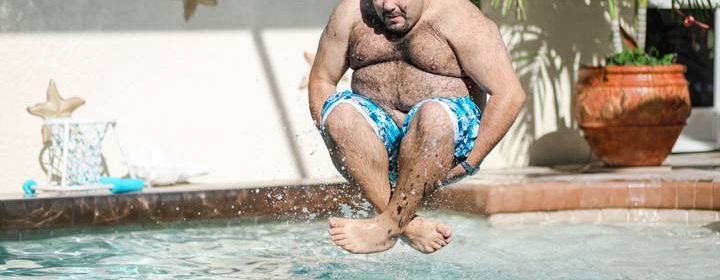Half of Americans admit to using a swimming pool as a bath. Here’s why you shouldn’t

Nearly half of Americans say that they’ve rinsed off in a swimming pool after exercise, after yardwork, or even gone swimming as a substitute for a shower, according to a new poll.
Oh, and yes, people still pee in the pool.
Related
 Parasites, bacteria in U.S. pools made thousands of people sick, CDC says
Parasites, bacteria in U.S. pools made thousands of people sick, CDC says
 These are all the germs lurking in your public pool, waterpark
These are all the germs lurking in your public pool, waterpark
The poll, conducted by Sachs Media Group on behalf of the Water Quality & Health Council, an industry association, is an annual look at Americans’ pool-related behaviours. It found that 40 per cent of people admitted to peeing in the pool as an adult, and half of people said they don’t shower before diving in.
Aside from just being gross, these unhygienic activities can affect the chemical balance of the pool, according to Chris Wiant, chair of the Water Quality & Health Council.
After exercising or hard work, he said, “You generate all kinds of organic matter. Could be sweat, it could be dirt, could be oil, grease, sunscreen, whatever.
“All those are the things that react to the disinfectant in the pool. So they may utilize all the disinfectant.”
There’s not an infinite amount of disinfectant in a pool, he said. It generally gets added gradually as the water is filtered. When chlorine contacts sunscreen or another contaminant like makeup, it changes. “It’s no longer able to disinfect but just becomes a contaminant itself in the water.”
When that happens, there’s less chlorine left over to tackle serious pathogens in the water.
“Let’s just assume your body, you’ve got sunscreen, you’ve got makeup, you’ve been sweating, your personal hygiene is not very good, all those things are going to combine with the chlorine,” he said. “So now if the next person gets in and actually has some kind of a bacterial or a viral disease, then those viruses can’t be killed by the chlorine because it’s already been consumed by the other material.”
That characteristic chemical pool smell? It’s actually from the chemicals created when chlorine reacts to foreign substances, according to the American Chemistry Council.
Pool pathogens are serious business. According to a study from the U.S. Centers for Disease Control, 27,000 people got sick in the U.S. between 2000 and 2014 as a result of dirty pool water.
The top culprit was a protozoa called Cryptosporidium, which can cause diarrhea and is actually resistant to chlorine.
This highlights another of the survey’s findings: people don’t wait long enough after a diarrhea attack before getting in the water.
One in four Americans would hop in the pool just an hour after having diarrhea, according to the survey.
“It’s virtually impossible to clean away all the bacteria, viruses or spores that might be associated with that kind of an illness,” said Wiant.
“What we find is that some of those diseases are pretty persistent, that you can have residual bacteria even the next day or even several days later. So you go to the pool, and what happens is that will get washed off in the pool.”
Then, it could be passed on to someone else, he said. The CDC says that diarrhea could be passed on for up to two weeks after an illness.
So if you’re recently sick and planning on getting in the water, don’t.
And if you’re healthy, you should still take a shower, Wiant said. “The best is to go in and take a full shower with soap. That protects you and the pool because it keeps that dirt out of the pool.
“But even if you go in and you get a good 60-second rinse that’s better than nothing.”
Also, “Don’t pee in the pool,” said Michele Hlavsa, chief of CDC’s Healthy Swimming program. “Swimming is a great way to be physically active and not peeing in the pool is a key healthy swimming step.”
The survey was of 3,100 American adults, conducted April 12-13, 2019, with an estimated margin of error of plus or minus 2.7 per cent at the 95 per cent confidence level. Results are representative of American adults in terms of age, race, gender, income and region.
Sign up for our Health IQ newsletter
© 2019 Global News, a division of Corus Entertainment Inc.
Source: Read Full Article


